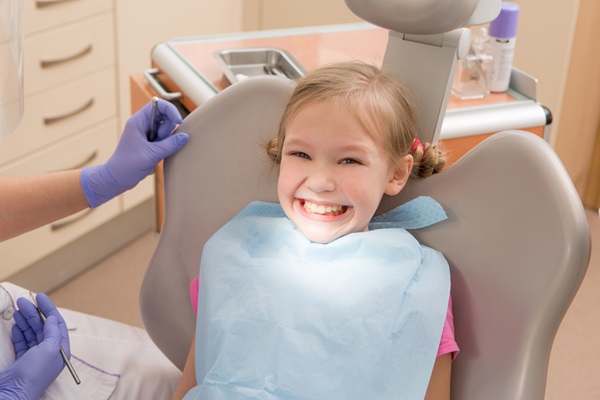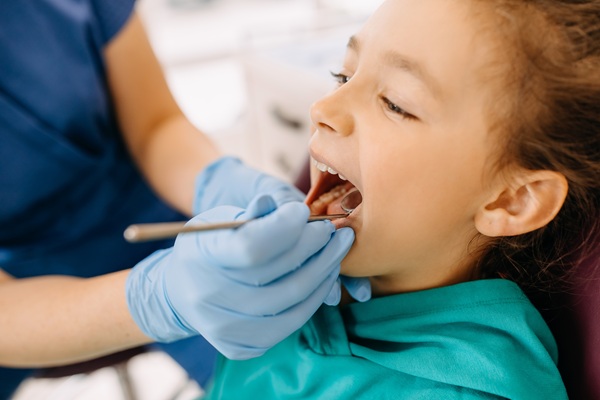How Dental Sealants Prevent Cavities in Kids

Dental sealants are one of the most powerful preventive care treatments for kids. Because children are especially vulnerable to cavities, parents need all the help they can get to help their kids fight tooth decay. Through this simple and pain-free procedure, your child can get powerful and long-lasting cavity protection on some of their most vulnerable.
Why children are susceptible to cavities
Children are more likely than adults to get cavities for a number of reasons. First, the enamel on baby teeth is less strong than on adult teeth. In addition, children are more likely to eat a diet higher in sugary or acidic foods and drinks when they are just learning proper oral hygiene.
However, the molars are especially vulnerable to tooth decay. Some baby molars and most adult molars have deep grooves and fissures on their biting surfaces, where plaque can collect and cause cavities. Tooth brushing often misses the plaque and bacteria that collect there, making it harder to prevent tooth decay.
How dental sealants help
Dental sealants contain a plastic resin that, when applied to the biting surface of molars and premolars, helps keep cavity-causing plaque and bacteria out of these groves and fissures. Once applied, they act as a barrier that fills the deep groves and fishers and stops cavities before they start. They provide an extra layer of protection during the years in which children are most vulnerable to cavities.
The dental sealant procedure procedure
The procedure itself is fairly simple and quick and can even be done by a pediatric dentist during a child's regular dental appointment. First, the dentist cleans and drys the teeth. Next, the dentist applies an acidic gel to roughen the teeth surfaces so the sealant material can adhere properly. After a few seconds, the dentist rinses off the acidic gel and cleans and dries the teeth again. During the final step, the dentist applies the sealant gel to the teeth surfaces and hardens it with a special light. There is no drilling or anesthesia required.
When children should get dental sealants
Dental sealants are generally recommended for children when their permanent molars and premolars come in. However, if the child has deep groves and fissures in their baby molars, a pediatric dentist may recommend sealants for those as well. The first set of permanent molars comes in around age six, and the second set comes in about age 12. Dental sealants can protect teeth for up to 10 years. Dental sealants should not be placed on teeth with active tooth decay.
Why see a pediatric dentist for dental sealants
A pediatric dentist is a dental specialist who focuses on children's dental care from infancy to 18. They have the most experience working with children and understand their unique needs. A pediatric dentist can provide the most accurate guidance on cavity protection for a child. These specialists not only provide dental sealants but also comprehensive therapeutic and preventive dental services for children.
Being proactive about preventing childhood cavities
There is something parents can do now that will greatly impact their child's oral health. Dental sealants offer years of important cavity prevention for kids. Call our office today to learn more about dental sealants and other pediatric dental services.
Request an appointment here: https://www.smiling-kids.com or call Myriam Cerezo, DMD, Pediatric Dentist at (215) 867-8243 for an appointment in our Holland office.
Check out what others are saying about our dental services on Yelp: Dental Sealants in Holland, PA.
Related Posts
Dental sealants are thin coatings that are applied to the chewing surfaces of the back teeth to prevent decay. Grooves and pits in these teeth make them susceptible to cavities because they may collect food and bacteria. Sealants for the teeth are an easy and painless technique to protect young ones' teeth from decay. This…
A Kid Friendly Dentist understands the importance of creating a welcoming and comfortable environment tailored to young patients' needs to help alleviate the child's stress or anxiety. Establishing positive dental experiences early on is not just about the present, but it also ensures children develop healthy oral hygiene habits that last a lifetime. Learn the…
Cavity treatment for kids is a chief concern among parents, and for a good reason. Cavities are common in children of all ages. According to the Centers for Disease Control and Prevention, over half of the kids ages 6 to 8 have had at least one cavity in a primary tooth. The good news is…
Going to an emergency pediatric dentist can give your child immediate dental needs. Treating urgent dental issues can provide relief right away. It can also prevent complications. Here are the necessary steps that you can take even before the drive to your emergency pediatric dentist.Showing distress will only intensify the child’s anxiety. This will make…


